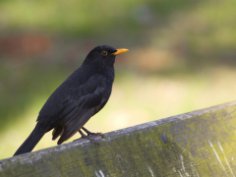
Something unthinkable happened in the country: the entire McDonald's chain, from Mexico to Canada, from the Pacific to the Atlantic, banned tomatoes. Can you imagine a Big Mac without a slice of tomato? Burger King followed suit, and following these fast-food giants, tomatoes were banned in America. Just like that: in the very place where they originated and where they were introduced to European eaters in the 16th century, tomatoes disappeared from the menu: salmonella. We endured.
Another unthinkable thing: our southerners are already traveling to Mexico to fill up with gasoline and diesel. Fuel prices are so high that even a rabid dog wouldn't have to travel seven miles to get to a Mexican gas station. We've endured it.
But as if tomato salmonella and foreign gas stations weren't enough, blackbirds have started pecking at us in Chicago. We're being attacked by blackbirds. They dive-bomb us, landing right on our heads. And they peck us painfully.
Who among us hasn't seen Hitchcock's “The Birds”? Filmed back in 1963, it has become a classic of American fantasy horror. It was Alfred Hitchcock's first film with Universal Studios. The film starred Rod Taylor and Jessica Tandy, who instantly became movie stars. The screenplay was based on Daphne du Maurier's novella of the same name. The film was so popular that a sequel, “The Birds 2,” was made twenty years later.
For those who haven't seen it, here's a brief synopsis of the plot: due to the disrespectful attitude of the residents of one town toward birds, the birds, united by a hive mind, decide to take revenge on humans. For the entire 90 minutes of the film, they attack humans in an increasingly violent manner. The plot thickens, the attacks become more sophisticated. But the human hive mind prevails—the people repent of the harm they inflicted on the birds, and everything ends happily.
Hitchcock simply jinxed it for us: no one harms the birds or animals in Chicago; on the contrary, they love people, birds, and all other city wildlife. And lo and behold, our blackbirds have simply gone berserk. We don't expect a happy ending just yet. Authorities are warning that male blackbirds attack suddenly and severely. Some have already been badly pecked. The birds are especially fond of swooping down from heights in the Lake Michigan coastal region, where we have dozens of miles of free beaches, parks, exercise facilities, volleyball and tennis courts, and bike paths. So cyclists were the first to fall victim to the birds. And then came joggers and those just walking.
Chicago ornithologists attribute these attacks to the unusually aggressive behavior of male blackbirds during the nesting season, which is currently occurring. Douglas Stotts, an expert on blackbird anomalies, explains that the bird will not attack a person if it sees them from the ground. But from the air, the blackbirds become confused and mistake a person for a stranger, a male intruder on their owner's territory.
Everyone has probably witnessed a bird attacking a window at least once in their life. The bird sees its reflection against the trees and sky in the glare of house and car windows, and begins to beat against the shiny surface, trying to drive away the “intruder.” Birds, as ornithologists explain, cannot see through glass. And the defenders sometimes fight their reflection to the death. Scientists advise in such cases to cover the window from the outside with paper or matte hardboard. But never from the inside—this will make the glass even more reflective to the bird.
Such attacks on glass are especially distressing to those inclined to religious and everyday superstitions. Ancients believed that birds were the souls of deceased ancestors. When such a “soul” batters your home, it comes for you. “Come on, then,” they say. “You've had your fun.” Even today, a bird flying into a house is considered a harbinger of imminent death. A messenger from the other world. A messenger. It's for such frivolous people that the advice about paper and hardboard is given. And for those who simply “feel sorry for the bird” or their own glass (a large bird can easily break it), ornithologists advise opening a window immediately and scaring off the aggressor. Or, alternatively, attaching a picture of a cat to the window.
So how should we combat our own flying bombers? A special broadcast on the BBC advised us to:
1. It was previously believed that birds wouldn't attack people wearing hats. This summer, several people wearing baseball caps were injured. Such incidents were already reported in the Chicago Tribune. From a bird's eye view, the peak of a baseball cap resembles a bird's beak. It's not the bird's fault. So, ride your bikes in good health, but wear helmets. And children with caring parents shouldn't ride without helmets at all.
2. If the thrush is already attacking, spread your arms wide to the sides – pretend to be a large bird and advance towards the thrush. It is afraid of large birds itself.
3. Ornithologists advise barking loudly like a dog when attacking. Thrushes are afraid of dogs.
4. Cyclists and mothers with strollers are advised to wear a large image of a cat.
It's all fun and games, but on June 28th, the city hosted another summer sporting event – a youth run. An eight-mile roundtrip along the park's shoreline. (I was disappointed, because the police had closed the beach to cars.) The runners, however, had to send out several helicopters. They usually “whitewash” the area with helicopters, but this year there was an additional reason to ensure extra safety for the participants – blackbird attacks. It's in this park area that our blackbirds are especially aggressive. And the birds are right, of course – it's a tasty morsel. There's water, food, and a sea of greenery. A real bird paradise.
As strange as it may sound, we Chicagoans live amidst pristine nature. Building regulations stipulate that every 8-10 square miles has historically been free from development. These areas are protected forests, where human intervention is prohibited. Visitors sometimes complain to me that the city's forests are neglected. They're deliberately neglected—it's not allowed. A fallen tree will lie there, just like in the wild. (But every tree is numbered and accounted for.) And since there are forests, there are animals in them. And that's our problem: just as animals once roamed their migratory paths, they still roam the highways today. Through private buildings and lawns in front and behind houses. Looking out the window one day, you might see a moose in your flowerbed. Basically, we live with the animals as if we were in a communal apartment.
Last weekend, a raccoon came to our picnic and ate from our hand, then got even more brazen and stole a hot shashlik from a disposable plate. Skunks and badgers roam freely on private property. Over the winter, a squirrel built a nest in my remote window air conditioner and gave birth to babies.
Our dogs don't bark or attack anyone, our cats don't catch mice, and they don't react at all to squirrels or birds. But we, two-legged creatures, have to live very carefully: you're always on the lookout for things you might run over, run over, or knock down.
We haven't yet seen any mass aggression from blackbirds, and we're not used to looking up, looking around with our eyes wide open. So, the raspberries are gone—now it's time to keep an eye out. And a blackbird, even in Russia, not only sings, but can also peck. So be careful, especially when out in the wild with small children. And may your “chosen songbirds of Russia” sing their beautiful songs to you.





